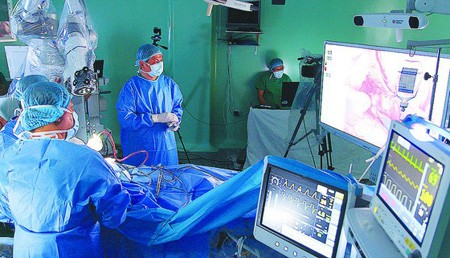
In 2019, HCMC Department of Health for the first time launched a contest for illness treatment quality, themed ‘Smart Healthcare’. 37 products and solutions from 38 private and public medical units were selected as the most effective and awarded.
These winners, all of which are technologically innovative and practical in the Industry 4.0 era, directly or indirectly aid both patients and the medical staff in the treatment process. They also help hospital managers to monitor health-related activities more conveniently.
In 2020, the healthcare sector in HCMC continues to develop more useful applications like ‘hospital and clinic browsing’, ‘online healthcare’, ‘technical equipment management’, ‘healthcare human resources management’ for officials or residents in need of medical care.
These products are the positive results of the project ‘Smart Healthcare’ held by the Health Department. They will no doubt contribute to improving medical services in the city and in the Southern region in general.
HCMC Department of Health is preparing the final draft of the project ‘Smart Healthcare in the Period 2020-2025, with a Vision to 2030’ for the approval of HCMC People’s Committee.
This project will focus on promoting the implementation of digital and smart technologies in the medical sector in order to establish a modern and effective healthcare system for residents in HCMC.
The new system is expected to help people in need access necessary information and advanced medical services more easily so that their health has a stable lifelong protection. This is one requirement of the city in the smart city transformation process.
To achieve the mission, the medical sector is going to introduce a digital medical record for each resident in HCMC. This document is shared and used among all medical institutes located in the city, considerably improving healthcare performance.
In addition, the city is going to build a smart treatment system with several utilities for patients to reduce disease diagnosis and treatment time.
A common major database about health and typical diseases of HCMC residents will be created, along with other supplemental databases on medical human resources, hospitals and clinics, medical equipment, technical specifications. They will then be integrated into the shared database of the city in the smart city transformation project.
Thanks to the new smart system, citizens will be able to easily interact with hospitals from a distance, select a suitable treatment department and clinic or preferred doctors without the need to wait aimlessly in hospitals like usual. They can also use medical test results among hospitals, check their health status and receive professional consultation from doctors remotely.
With this system, it will be exceptionally convenient for doctors in the same hospital as well as others to exchange knowledge and share experience via online seminars. Thus, the need to transfer patients from hospital to hospital will decrease significantly.
Officials in the medical sector and the local authorities will make use of precise data in this smart system to deliver timely announcements to the public, especially as to upcoming epidemics. The emergency line 115 can also use it to assign staff more effectively to avoid over- or under-staff situations in certain hospitals.
The ten developments to prepare for the smart healthcare system:
(1) Perfecting the Health Information System (HIS);
(2) Introducing the Laboratory Information System (LIS);
(3) Introducing the Picture Archiving and Communication System (PACS) and Radiology Information System (RIS);
(4) Integrating data from HIS, LIS, and PACS/RIS to form a detailed medical record for patients;
(5) Creating digital clinical records and health records;
(6) Applying new recognition technologies to identify patients precisely and avoid mistakes in delivering patient information;
(7) Applying algorithms of machine learning to build automatic reminding, warning systems regarding waiting time for medical diagnosis and test result in order to avoid congestions; and to change speech to text to save in digital clinic records;
(8) Researching and applying AI software in disease diagnosis and treatment;
(9) Developing applications to interact with patients via mobile devices and websites;
(10) Ensuring information security through strict policies and regulations related to operating data collection systems in hospitals (from the check-in to check-out stages as well as digital health record accesses).
























